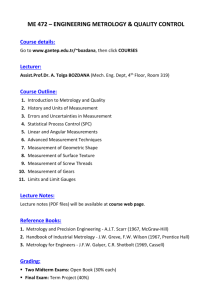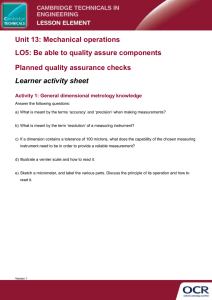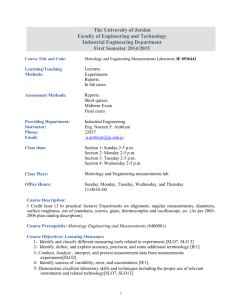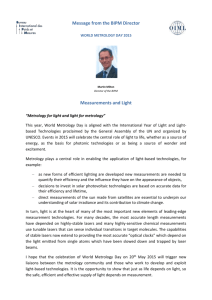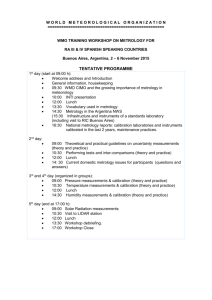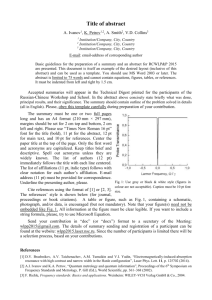Summary Technical Specification
advertisement
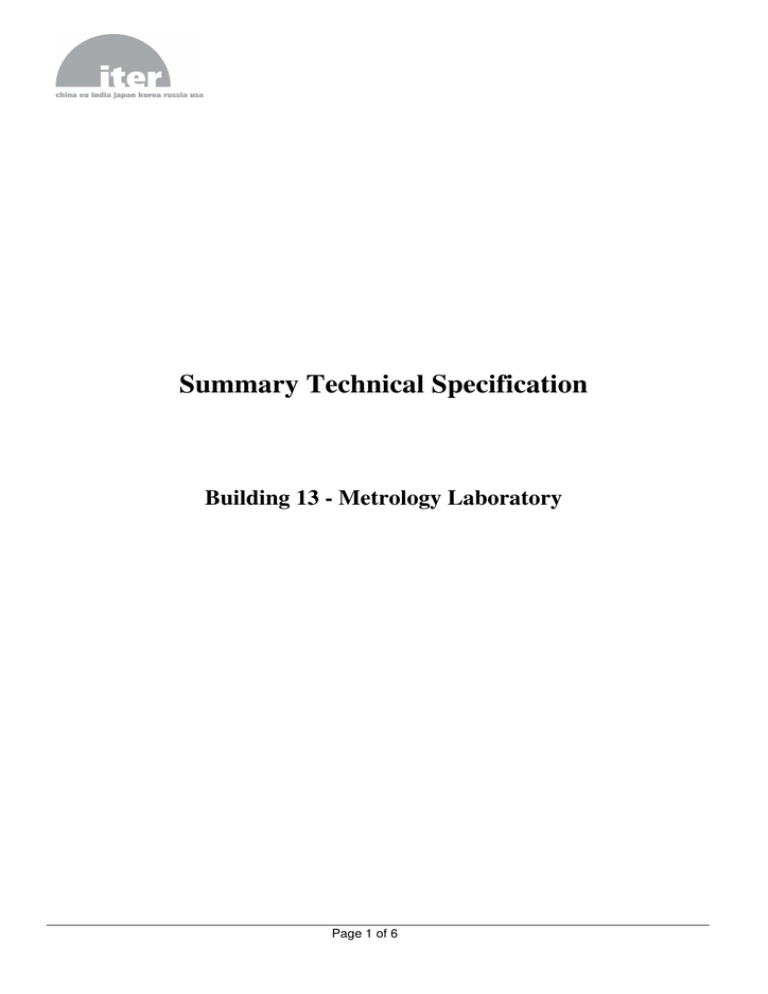
Summary Technical Specification Building 13 - Metrology Laboratory Page 1 of 6 1. Purpose The purpose of this Call for Nomination is to identify potential companies or consortia having the capacity to supply a Metrology Laboratory for the ITER Project. This Summary Specification provides an overview of the requirements for a turnkey contract to supply the IO with a Metrology Laboratory. 2. Background ITER is a joint international research and development project that aims to demonstrate the scientific and technical feasibility of fusion power. The partners in the project - the ITER Parties - are the European Union (represented by EURATOM), Japan, The People’s Republic of China, India, the Republic of Korea, the Russian Federation and the USA. ITER will be constructed in Europe, at Cadarache in the South of France. The Construction Management Section/Division is responsible for all aspects of dimensional control from acceptance testing of the constituent parts through to their final operational alignment. The ITER machine consists of many individual components and assemblies which must be accurately and precisely measured and aligned for the Tokamak machine to operate, therefore; an area of approximately 33m (L) x 7m (W) x 7m (H) has been allocated within Building 13’s Assembly Hall to establish and fit out the metrology laboratory. The allocated space is considered valuable and the requirements for the laboratory have been carefully considered to match the project demands therefore; the size of the laboratory and equipment installed within it are based on IO metrology support requirements. 3. Scope of Work The scope of work is based on a turn-key approach to deliver a permanent construction metrology facility situated within Building 13, which will support the functionality of the metrology equipment within it. It includes: • • • • • • • • • Development of IO Concept Design into a Developed Design. Presentation of the Developed Design for review in accordance with IO procedures. Production of a complete Technical Design suitable for construction. Presentation of the Technical Design for IO review in accordance with IO procedures. Coordination of design with the Architect Engineer for Building 13 structural and services interfaces. Manufacture of the Metrology lab Construction of the laboratory on site. Testing and commissioning of laboratory systems. Design, supply, install, test and commission all lifting equipment necessary for the operation and maintenance of the laboratory Page 2 of 6 4. Description The main features of the laboratory are described in this section. Full detailed description will be provided in the final technical specification document. The metrology laboratory shall be a limited access facility for use by qualified trained staff for the purpose of conducting dimensional measurements. It shall have a controlled environment (temperature, pressure, humidity) to optimise measurement accuracy provided by an integrated heating, ventilation and air conditioning (HVAC) system. The laboratory shall contain expensive precision dimensional measurement instruments (not supplied under this contract) that will require proper setup, use and maintenance. It is therefore important that the detailed design of the Laboratory considers the requirements of these instruments.. The level of cleanliness of the laboratory shall be carefully monitored to avoid contamination of components within it. A general procedure shall be implemented for users of the lab to follow and obey; ensuring the cleanliness of the lab is maintained. The selected Contractor shall elaborate the concept design, present a detailed design for approval, pre-manufacture the Laboratory, construct it at the ITER site and commission it for use. Metrology Equipment Planned A variety of standard and specialised measuring equipment will be utilised within the Metrology laboratory to include a fixed coordinate measuring machine, granite surface tables, digital height gauges, portable measuring arms, portable laser trackers and a selection of ancillary precision manufactured products to support the metrology tasks i.e. gauge slips, dial test indicators, micrometers, vernier callipers, angle plates, parallels etc. The supply of this equipment is out of the scope of this contract. The bulk of the equipment is planned for delivery within the year 2017, ready to support dimensional control for construction of the ITER Tokamak Machine. Not all portable instrumentation is used at the same time; therefore an allocated secured storage area is needed within the laboratory layout. The laboratory is divided into 3 main working areas covering all IO metrology responsibilities: • • • Working Area 1 - Non-Portable Metrology Tasks e.g. component inspection Working Area 2 - Portable Metrology Tasks i.e. pre-alignments, inspections etc. Working Area 3 - Instrument Calibration (combined area 1&2), at eastside of facility. Page 3 of 6 HVAC Specification The temperature within the metrology Laboratory shall be controlled at 20oC +/- 1oC, to minimize the effect of the differential expansion of materials. The rate of change of temperature shall not exceed 1oC/day and 0.5oC/hr. Measurement areas within the laboratory shall be held at a small positive pressure above the external atmospheric pressure, so as to reduce the ingress of pollutants. Metrology Laboratory Location & Environment The metrology laboratory shall be positioned within Building 13 on the south east corner of the Assembly Hall, as indicated in figure 2. The laboratory will be located close to all planned assembly operation in the building, giving support when needed. Figure 2: Metrology Laboratory situated within Building 13 Environment The environment within Building 13 shall be supported by its own HAVC system, providing a stable and uniform temperature distribution of 20oC (winter) to 25oC (summer) +/- 2oC and a relative humidity less than 70%. The Metrology Laboratory’s inlet and exhaust for its HVAC system shall be from/to the assembly hall. Page 4 of 6 5. Timetable It is estimated that the contract duration will be 12 months from the start of the contract as follows Concept Design Developed Design Technical Design Construction, commissioning & IO acceptance Completed by IO TO +8 weeks TO + 27 weeks TO + 51 weeks TO: start of the contract 6. Quality Assurance requirements The organisation conducting these activities should have an ITER approved QA Program or an ISO 9001 accredited quality system. 7. Experience The company or consortia of companies selected shall be recognised for their knowledge and expertise in construction of various types of laboratories, to provide the correct environmental conditions that are needed to support various types of instrumentation and metrology activities. For a turn-key solution chosen companies or consortia of companies shall have proven expertise and knowledge in the full concept range of supplying a full functional laboratory suitable for the customer’s needs and expectations, including areas such as: • Budgeting & Planning • Laboratory Design & Engineering • Laboratory Construction & Assembly • Laboratory Certification Approval • Laboratory Recertification • Preventative Maintenance Services 8. Tentative procurement schedule The tentative schedule is as follows: - Call for nomination submission : November 2015 Prequalification submission: January 2016 Tender submission : March 2016 Contracts signature: July 2016 Page 5 of 6 9. Candidature Participation is open to all legal persons participating either individually or in a grouping (consortium) which is established in an ITER Member State. A legal person cannot participate individually or as a consortium partner in more than one application or tender. A consortium may be a permanent, legally-established grouping or a grouping, which has been constituted informally for a specific tender procedure. All members of a consortium (i.e. the leader and all other members) are jointly and severally liable to the ITER Organization. The consortium groupings shall be presented at the pre-qualification stage. The tenderer’s composition cannot be modified without the approval of the ITER Organization after the pre-qualification. Legal entities belonging to the same legal grouping are allowed to participate separately if they are able to demonstrate independent technical and financial capacities. Candidates (individual or consortium) must comply with the selection criteria. The IO reserves the right to disregard duplicated reference projects and may exclude such legal entities from the pre-qualification procedure. Page 6 of 6
